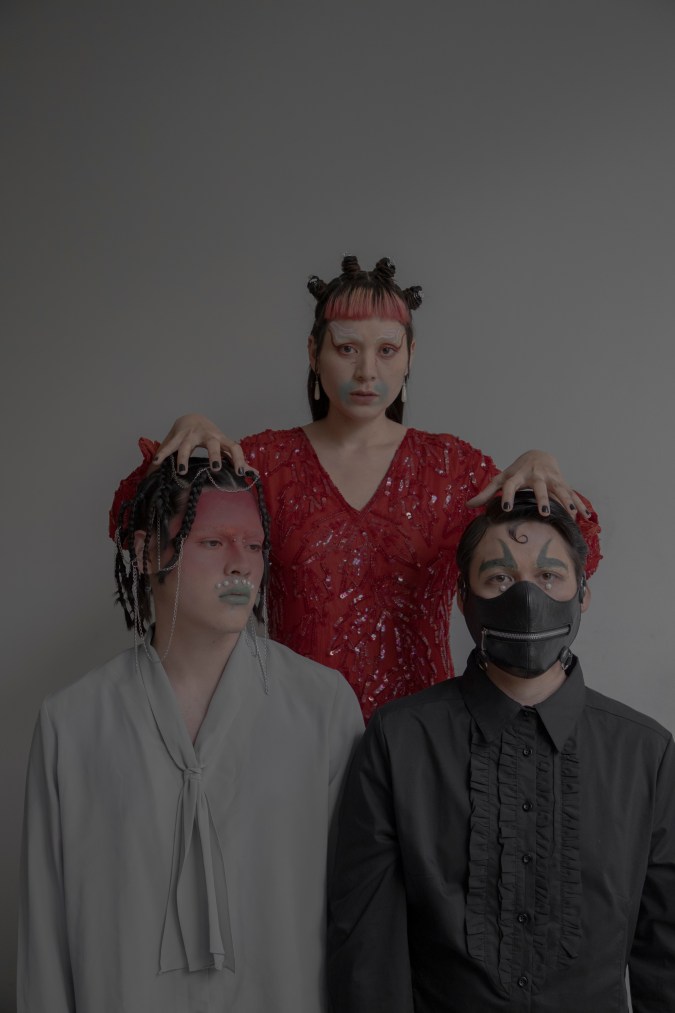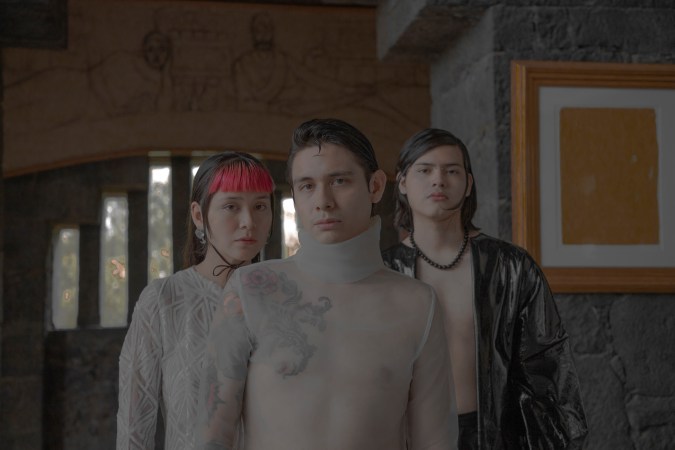Mexico City-based Valgur’s bilingual synth-pop speaks to a generation of young people fed up with femicides, sexual assault, and the ever more pervasive violence in Mexico. Denouncing that violence, from the societal to the personal, has become the impetus for the music they create.
In 2018, founding members Elizabeth and Hugo Valdivieso made an announcement that rocked the side of their family heavily involved in the corrupt local politics of their hometown of Juchitán, Oaxaca. Among the money launderers, public funds pilfering evangelical ministers, and shady nudist hotel owners, was their cousin who they allege raped them as children. They called him out on Facebook, effectively wrecking his campaign for city council.
The act became the driving force behind Zapandú, a darkly catchy collection of songs sung in Spanish and the dialect of Zapotec spoken in Oaxaca’s Istmo de Tehuantepec. The album was released by the Mexican independent label Stupid Decisions in March, and they’re taking it on a nationwide tour in October.
Visibly empowered by the brave decision to speak out, they are open to talking about it, which seems necessary for discussing songs with lyrics like “Wah-oh-oh, los tristes pensamientos/ Somos tres sacados de un cuento de terror/ Wah-oh-oh, los malos recovecos/ Muchos son los años hoy.”

In their mod, mid-century apartment in Mexico City, I ask how the act of going public has affected their music. “En todo,” they say in unison, as they tend to do. “It’s been a motor to continue making it,” Elizabeth says.
Some songs on the album were sparked by the widespread societal violence that is only growing worse in Mexico. In 2018, their hometown of Juchitán was the ninth most dangerous municipality in the country, much of that ranking owing to femicides. “Some people don’t know how to dance to a song like El Pozo,” Hugo says. “They don’t know whether they should dance or cry,” says Elizabeth.
The song gives a voice to the countless murdered women in Mexico who, like its subject, are forgotten by society each year. “Cuando los demonios me soltaron en el pozo,” begins the chorus. In the bridge: “Todos callan, qué mal/ No parezco en los diarios/ Todos callan, qué mal/ Cuando yo ya morí.” It ends with Elizabeth repeating the line, “En el pozo sin voz,” as a journalistic voice announces macabre local headlines in the background.

“Kids in Juchitán see themselves immersed in a culture of violence,” says Hugo, “but the idea — same as with other musicians, artists, and rappers there — is to have an impact on the young people.”
But the album isn’t all tragedy. Ultimately, it’s about overcoming it by finding a place for tradition in an ever-globalizing society, one that, according to “Infancias Trágicas,” at once designs and devours those living in it.
Zapandú is a fragrant root used by women in Juchitán to perfume their long, dark hair, and the title track reminisces on talks with the singer’s grandmother about this old Zapotec tradition. “It was magic, ‘Zapandú,’” says Hugo, and he and his sister both get excited reliving the act of creation.
“From the first riff…” they say in unison, and he continues, while she plays the chords on a nylon-stringed guitar. “The first one I came up with: bam, bam bam bam bam… We were both like, ¡ah, verga! For me, the first one never takes. I’m always thinking as a musician that I can do better. But we tried many other riffs and none of them were any good! The first one stuck, and that’s why the song is magical,” he says.

The opening track “Rogelia” is sung in Zapoteco istmeño, the language spoken in their home as children. With its infectious syncopation and glitchy, muted intro, it might be surprising to discover that it’s an homage to their late grandmother: “Be’za cuananaxi, Rogelia/ Bacuxu gundani lii ngà Rogelia.”
She is likened to a cluster of fruit, to climbing vines of pink and white flowers. More than a love song, it’s “a dialogue between tradition and globalization,” an apt description for one sung in a language with one of the earliest writing systems in the Americas accompanied by musical technologies invented in the latter decades of the 20th century. “Rogelia” is one that saw quite a bit of tinkering between original thought and final product, and I’m lucky to get to hear Elizabeth play the first verse in its original ¾ time on her guitar.
Most listeners assume that the sexual assault as children inspired the song “Bupu,” whose vague but menacing subject foams at the mouth. (Bupu, Zapotec for espuma, is a foamy, super sweet pre-Hispanic drink from Juchitán.) “Everyone thinks that,” they both say. “I came to think of it that way, myself” says Elizabeth, “or rather, about assault in general, and my experiences as a woman.”
However, it was originally inspired by the local urban legend of the bidxhià, the Zapotec name for the shape-shifters called nahuales elsewhere in Mexico. The short-lived, hard-hitting number, like the rest of the album, blends thousand-year-old customs with modern sounds to get you both dancing and thinking at once.
After a 7-date “calentamiento” earlier this year, the band is about to begin its first full tour of Mexico, a 15-city romp they’re calling Vicios Juveniles. Check their Instagram for dates and don’t miss them if you have the chance.
Stream ‘Zapandú’ here:




